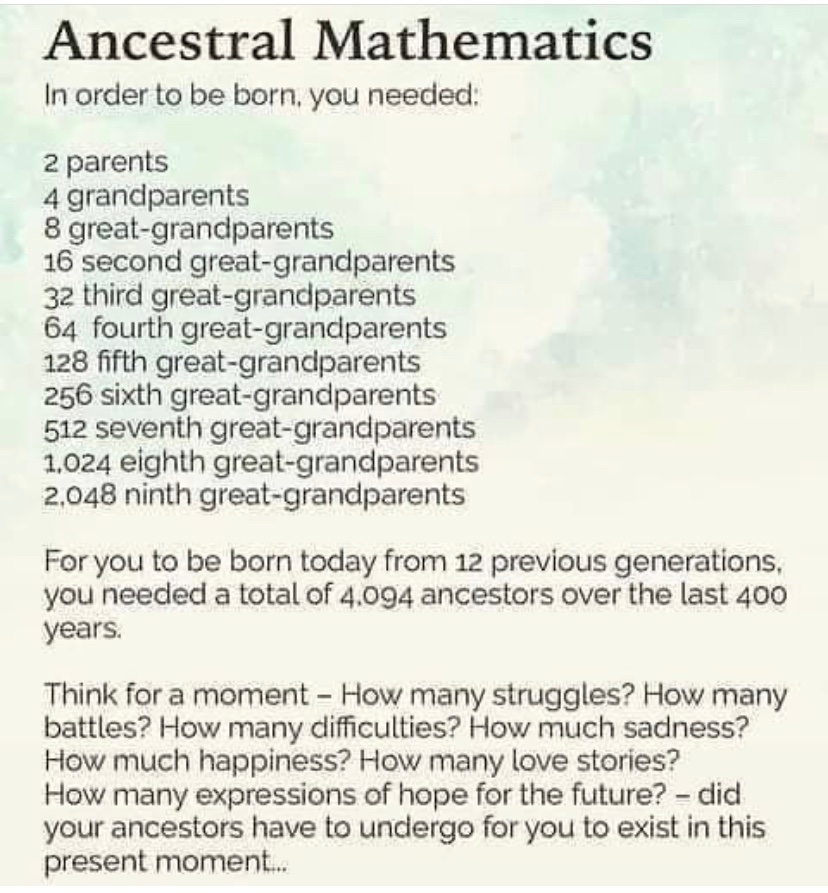Another month has passed. Visit www.familytreewebinars.com to see whether you would like to watch any of these presentations in real time or during the following week.
Wednesday, September 2 - "Using Chromosome Browsers, Segment Data and Triangulation" by Michelle Leonard. Intermediate
Wednesday, September 9 - "Cyndi's List in Practice" by Cyndi Ingle. Beginner, Intermediate
Tuesday, September 15 - "Reconstructing the Murphy Family Using DNA & Documentary Evidence" by Melissa Johnson. Intermediate
Wednesday, September 23 - "Introduction to VPNs" by Thomas MacEntee. Intermediate, Advanced
Wednesday, September 30 - "5 Ways to find your Family in Southern Manuscript Collections" by J. Mark Lowe. Intermediate
Monday, August 31, 2020
Sunday, August 23, 2020
Ancestral Mathematics

Mary Anne shared the chart above. When your friends or relatives ask whether you're "done" with your genealogy research, use this example to explain why not!
Thanks, Mary Anne.
Friday, August 21, 2020
Today's Chuckle
My favorite line from a recent commercial:
"Your father's been researching our genealogy: we're Vikings!"
"Your father's been researching our genealogy: we're Vikings!"
Friday, August 14, 2020
Overlooked Genealogy Resources
If you read Internet Genealogy, you might remember Diane Richards' column called Net Notes. She describes recent website discoveries in each issue. She combined a group of these in a presentation called "Fifty Overlooked Genealogical Resources in Fifty Minutes." I am reporting a partial list of websites she mentioned. You can Google any that are of interest.
Endangered Archives Program: funds digitization projects to preserve content of archives.
Mexican War Soldiers and Sailors
Europeana Newspapers
Frederick Douglas Newspapers
From the Page: a resource for collaborative transcriptions
Crowd Source Indexing: created for genealogical indexing; both large and small projects
The Ancestor Hunt
Online Genealogy Records: Google "death indexes"
Linkpendium
Digital Public Library of America
FreeUKGenealogy
Can Genealogy: a handy guide to the best Canadian resources
Peel's Prairie Provinces
Endangered Archives Program: funds digitization projects to preserve content of archives.
Mexican War Soldiers and Sailors
Europeana Newspapers
Frederick Douglas Newspapers
From the Page: a resource for collaborative transcriptions
Crowd Source Indexing: created for genealogical indexing; both large and small projects
The Ancestor Hunt
Online Genealogy Records: Google "death indexes"
Linkpendium
Digital Public Library of America
FreeUKGenealogy
Can Genealogy: a handy guide to the best Canadian resources
Peel's Prairie Provinces
Saturday, August 8, 2020
Court Record Books, Online German Church Registers, Google Docs
We continue to enjoy the National Genealogy Society's virtual conference. Recent sessions touched on a wide variety of topics.
Court Record Books was actually titled "FamilySearch's Secret Weapon." The court record books that are available in the FamilySearch catalog include reports of cases dealing with all sorts of offenses where an ancestor's name may be mentioned. Examples included alimony back payment, indentures, mortgage foreclosures, ferry licenses, lists of jurors, etc.
Many of the records are available online. If you have an interest, the easiest way to locate a record is to go to the catalog. Use "court record books" in the keywords selection and choose "online." These records are not indexed so you will need to browse in a location and time period where your ancestor may have been mentioned.
Online German Church Registers provided an overview of the most common types of records, online sources, and an explanation of what might be found: originals, duplicates, recopied records, indexes, transcripts or abstracts. The speaker also pointed out that German immigrants in America followed the same format in their German language churches.
Transcribe and Take Note was a discussion of Google Docs, Sheets, and Keep for data collection. It was evident that the speaker was a long-time user of these tools. In Google Docs she demonstrated how to create automatic transcriptions of typed and handwritten text, how to insert a bookmark, voice typing, etc. We learned how to add links to Google Sheets and how to use it side by side with Google Docs. Google Keep is a note-taking app that allows you to save web pages. The speaker's examples were focused on time lines, genealogy reports, and research logs.
Court Record Books was actually titled "FamilySearch's Secret Weapon." The court record books that are available in the FamilySearch catalog include reports of cases dealing with all sorts of offenses where an ancestor's name may be mentioned. Examples included alimony back payment, indentures, mortgage foreclosures, ferry licenses, lists of jurors, etc.
Many of the records are available online. If you have an interest, the easiest way to locate a record is to go to the catalog. Use "court record books" in the keywords selection and choose "online." These records are not indexed so you will need to browse in a location and time period where your ancestor may have been mentioned.
Online German Church Registers provided an overview of the most common types of records, online sources, and an explanation of what might be found: originals, duplicates, recopied records, indexes, transcripts or abstracts. The speaker also pointed out that German immigrants in America followed the same format in their German language churches.
Transcribe and Take Note was a discussion of Google Docs, Sheets, and Keep for data collection. It was evident that the speaker was a long-time user of these tools. In Google Docs she demonstrated how to create automatic transcriptions of typed and handwritten text, how to insert a bookmark, voice typing, etc. We learned how to add links to Google Sheets and how to use it side by side with Google Docs. Google Keep is a note-taking app that allows you to save web pages. The speaker's examples were focused on time lines, genealogy reports, and research logs.
Subscribe to:
Comments (Atom)
